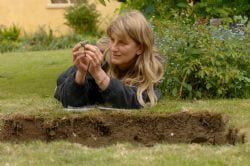Ground-breaking historical research: how we can all get involved
24 February 2016
A leading archaeologist and historian will explain how her experience on Channel 4’s Time Team programme helped her develop new ways of enabling people from all walks of life to get involved in ground-breaking historic research at a talk this month. In the latest instalment of the Great Minds lecture series at the University of […]

A leading archaeologist and historian will explain how her experience on Channel 4’s Time Team programme helped her develop new ways of enabling people from all walks of life to get involved in ground-breaking historic research at a talk this month.
In the latest instalment of the Great Minds lecture series at the University of Lincoln, UK, Carenza Lewis, who is the Professor for Public Understanding of Research at the University will talk about projects she has directed which have involved thousands of members of the public, including more than 5,000 teenagers, in making new discoveries about the past while simultaneously developing skills for the future.
She will show how discoveries in scores of everyday rural communities have simultaneously inspired participants and contributed to new ‘big pictures’ of the past advancing academic knowledge of seismic historic events such as the Black Death.
The audience will be encouraged to think about how they too could get involved in historical research and develop new ideas for their own university-linked research projects.
Her talk, The Black Death and beyond – New approaches to engaging the public in academic research, will take place on the University of Lincoln’s main Brayford Pool Campus on 1st March 2016 at 6pm, with registration from 5.30pm. The lecture will be followed by a Q&A session with members of the audience. Admission is free but booking is essential. Priority will be given to groups from UK schools and colleges.
Professor Lewis said: “I believe that research is best when it reaches way beyond university walls, and this is evident in the way that increased opportunities for people to get involved are transforming our ability to understand the impact of events such as the Black Death; indeed, we now have the capacity to measure the impact of the Black Death on any rural community across England, the UK, Europe and beyond thanks to public involvement.
“At the same time, participation in these projects has been shown to deliver a wide range of benefits to participants and host communities. This sort of research helps to advance our understanding of the past, enrich lives today and raise aspirations for the future and that is why I look forward to encouraging people to get involved in new projects.”
The University of Lincoln’s Great Minds guest lecture series aims to provide inspirational insights into different aspects of society – from the entertainment world to elite sport – for school and college students in Years 11, 12 and 13. A limited number of places are also available to the public.
Professor Lewis joins the ranks of other notable names to have already spoken at this year’s Great Minds series, including naturalist and broadcaster Chris Packham, TV presenter Jason Bradbury, Speaker of the House, the Right Honourable John Bercow MP, and crime writer Ann Cleeves.
The next speaker in the Great Minds series will be engineer Abbie Hutty, who is working on Europe’s first Rover mission to Mars, the ExoMars Rover project. She will deliver her talk on 16th March.
To book a place at a Great Minds guest lecture, visit www.lincoln.ac.uk/events or email events@lincoln.ac.uk.
